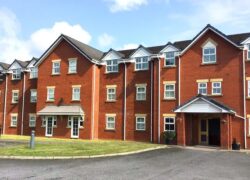Gender: Male
Age: 18+
Bed: 28
The individually designed wards will replicate the well-established rehabilitation and treatment pathways already successfully offered by Cygnet in other Neuropsychiatric Rehabilitation services; facilitating a clear and distinctive care and treatment pathway led by an all-encompassing in-house clinical and medical team.
We ensure person-centred outcomes are maximised through inter-disciplinary working, whilst keeping the individual at the heart of their discharge planning.
This service will be able to accept individuals using a variety of legal frameworks, including those under the Mental Health Act.
Cygnet Paddocks is located in Widnes, in the North West. The local area has many parks and nature reserves, and the service is well connected by public transport to nearby supermarkets, cafés and leisure activities.
Our in-house interdisciplinary team:
- Neuropsychiatrist / Psychiatrist
- Specialty Doctors
- Neuropsychologist / Psychologist
- Occupational Therapists
- Speech and Language Therapists
- Physiotherapist
- Clinical Hospital Manager
- Clinical Head of Care
- Nurses across RMN/RGN/RNLD disciplines
- Support Workers
Our service user profile:
- Men aged 18+ affected by an ABI or neurological condition where challenging behaviour is the leading impairment
- Men with complex presentations who could have co morbid mental health diagnoses, neurological or non-epileptic seizures
- May be detained under the Mental Health Act, informal or subject to DoLS
- May have a forensic history
- With a diagnosis of:
- Established or suspected Acquired Brain Injury including those sustained through trauma, anoxia, stroke, tumour, virus or infection
- Specialist Dementia e.g. Frontotemporal Dementia
- Established or suspected neurodegenerative condition including Huntington’s Disease
- Alcohol Related Brain Disease
- Presenting symptoms may include:
- Dysphasia or other communication problems
- Dysphagia with or without the requirement of PEG support/modified diets
- Moderate to severe cognitive impairment
- Mobility impairments
- Psychiatric disorders including psychoses
- Post-ictal psychosis
- Organic personality disorder
